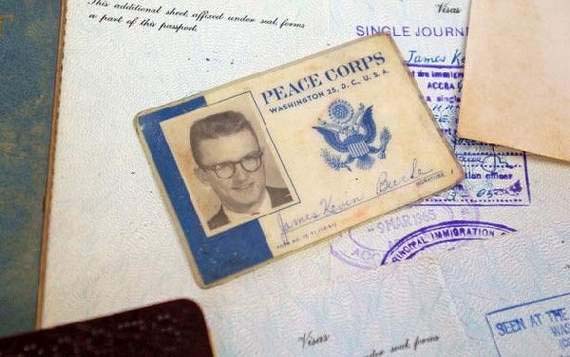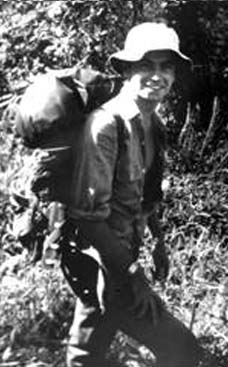
One of the very first Peace Corps volunteers ever, Mr. Burke was part of a 14-man group that went to Guinea and Chad, tasked with assisting agricultural development in thoseWest African nations. When he joined the Peace Corps, he was a Latin and Greek teacher from Roxbury, not exactly an agricultural expert. He was, however, his wife Linda said, able to fix anything, tractors included. He also was able to speak French, helpful because of the French presence in so many of the West African countries. Mr. Burke was aware, even then, of the political realities of his host nation. Guinea was one of the earliest African countries to shed its colonial ties, having separated from France. That independence, however, cut the country off from any international currency and left its citizens trying to trade perishables like bananas for equipment and arms.
Guinea RPCV Kevin Burke's African Collection from from the Central African Republic, Chad, Nigeria, Ghana and Sierra Leone Headed To Peabody Museum
Bourne Couple’s African Collection Headed To Peabody Museum
Posted in: Front Page Stories
By DIANA T. BARTH
Nov 16, 2007 - 9:13:11 AM
Caption: Kevin Burke's ID from his Peace Corps days in Africa. His collection is going to the Peabody Museum. Cape Cod Times/ Steve Heaslip
From 1963 through to his retirement from the foreign service in the 1990s, Buzzards Bay resident and Army Corps of Engineers Park Ranger Kevin Burke had a hand, in one way or another, in the economic development of countries in West and Central Africa.
From purchasing the wooden toy cars that young boys made from either looking at a picture in a magazine or examining a car parked on the street, to buying household goods in the marketplace, Mr. Burke and Linda A. Burke, his wife of 40 years, supported the local economy during the years they lived and worked in Africa.
Aside from the benefits derived from Mr. Burke’s work in the foreign service, one of the results of those years is half a lifetime’s worth of memories, in concrete form.
The Burkes have everyday items such as footed baskets and straw mats, and “charity” purchases like the little carved wooden vehicles bought so that young people, and the village elders who accompanied them, had cash to buy medicine, cloth, thread, and other items. The cars Mr. Burke bought so many years ago have wheels carved from discarded sandals and doors and trunks that open and close.
Many of the people from whom he purchased artifacts did not see themselves as artists, Mr. Burke said. Unlike their more sophisticated counterparts in Nigeria, Ghana, or Haiti, they did not have the ability to market their goods in an organized way.
Mrs. Burke said that often people would come to their back door with items to sell.
The couple has boxes filled with animal-shaped metal knife rests from Chad, dance costumes left with the family as a thank-you for providing lodging when dancers visiting from remote areas came to town, carved human figures and little herds of animals, and bowls bought when Mr. Burke went on safaris into the interior.
Each item brings back memories, but the couple have decided, however, that it is time to downsize and part with their collection.
Mr. Burke has offered it to Harvard University’s Peabody Museum of Archaeology and Ethnology in Cambridge.
The dance costumes, the collection of passports with visas and entry stamps longer than a man’s arms, and documentation of early Peace Corps activity in Africa interested the museum, Mr. Burke said.
He is now creating an inventory of all of the items at the museum’s request.
One of the very first Peace Corps volunteers ever, Mr. Burke was part of a 14-man group that went to Guinea and Chad, tasked with assisting agricultural development in thoseWest African nations.
When he joined the Peace Corps, he was a Latin and Greek teacher from Roxbury, not exactly an agricultural expert. He was, however, his wife Linda said, able to fix anything, tractors included. He also was able to speak French, helpful because of the French presence in so many of the West African countries.
Mr. Burke was aware, even then, of the political realities of his host nation. Guinea was one of the earliest African countries to shed its colonial ties, having separated from France. That independence, however, cut the country off from any international currency and left its citizens trying to trade perishables like bananas for equipment and arms.
After just a few years in Africa, Mr. Burke left the Peace Corps and became a part of USAID, the US Agency for International Development, and a foreign service officer stationed in places like the Central African Republic and Nigeria.
Later, he moved to Washington, DC, and his mission changed. In Africa, he had worked hands-on with agricultural projects and public health efforts such as developing stationary and traveling health clinics or bringing in experts from the US to study issues such as the eradication of malaria or river blindness, a parasitic infection found in the Upper Volta.
In Washington, he was conceptualizing the projects, getting Congressional approval in some cases, ensuring that the projects were funded, and then traveling back to Africa for short periods to oversee their implementation.
At the beginning of his time in Africa, he said, there was a huge outpouring of love for America. He described visiting huts where there were shrines to John F. Kennedy and other notable Americans of the time. The people saw Americans as people who had come to help save “one and all.”
The reality was not always as altruistic as the expectations. Mr. Burke said that many of the USAID projects were designed and implemented in such a way as to ensure that the dollars stayed in the US. Part of his USAID mission was helping American oil companies access the interior so that they could survey for potential oil.
Most of those companies gave up on that idea at the time because of the high cost of the lack of infrastructure and high cost of healthcare. As the Vietnam War ramped up, USAID dollars flowing to Africa slowed.
Since that time, the Chinese, Mr. Burke said, have been filling in the gap and are now heavily established in the area, mining bauxite in Guinea, and taking advantage of uranium, oil, and other natural resources.
“China now has a dramatic influence,” Mr. Burke said.
He ended his USAID career by leaving Washington and going back to Guinea Bissau, a formerly Portuguese area, returning to hands-on work. His expertise with computer and communications systems was helpful there.
The interior of Africa—Niger, Chad, the Central African Republic—was “stunning in terms of remoteness,” Mr. Burke said, and the site of “poverty beyond most people’s recognition.”
During his career, he worked in villages where people had no matches, so they took the fluffy, yellowish fiber surrounding the seeds of the kapok tree and lit it from a spark obtained by smashing stones together.
The native Muslim populations were unfamiliar with many aspects of modern life. Italian priests working at a mission on the southern border of Chad painted cement blocks different colors; people came and stood and stared at the blocks, Mr. Burke said, stunned by the sight of the kaleidoscope of colors, a far contrast from their mud-colored landscape.
Most of the items the Burkes collected during the years were not intended as part of “a collection.” They were purchased because the Burkes were “keenly interested in each and every aspect of the subsistence-level people trying to participate in the mainstream economy.”
“I was totally fascinated to see what things were created and brought to the so-primitive marketplaces to gain access to local currency,” Mr. Burke said, especially the ingenuity of the older children with their toys.
Mr. Burke said he bought many of the goods now offered to the Peabody Museum as a way of recognizing hard or clever work on the part of the makers of those goods. Hopefully, new generations of museum goers will gain insight into the subsistence way of life that plays into current African struggles, as well as enjoy the artistry of the items the family obtained over the years.
Mr. Burke is now working as a park ranger for the US Army Corps of Engineers, where he is able to pursue an art of his own: photography. Enterprise readers will find his name on photo credits in many issues of the newspaper.













